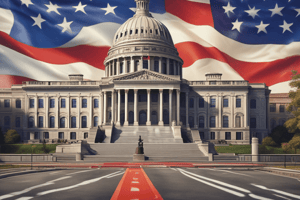Podcast
Questions and Answers
What is the supremacy clause and why is it important?
What is the supremacy clause and why is it important?
The supremacy clause makes the Constitution and all laws on treaties approved by Congress the supreme law of the land. It is important because it requires judges in state courts to follow the Constitution or federal laws and treaties in case of conflict with state laws.
How does the Constitution balance state powers with powers granted to the national government?
How does the Constitution balance state powers with powers granted to the national government?
It includes phrases that set forth the powers and limitations of the national government over citizens and state governments.
How did the delegates at the Philadelphia Convention deal with the issue of slavery?
How did the delegates at the Philadelphia Convention deal with the issue of slavery?
They left out the words slave and slavery, while several provisions in the Constitution protect the institution.
What powers did the national government have over state governments and the people?
What powers did the national government have over state governments and the people?
What limits did the delegates place on the national government?
What limits did the delegates place on the national government?
What limits did the delegates place on state governments?
What limits did the delegates place on state governments?
How did slavery affect the distribution of national and state powers?
How did slavery affect the distribution of national and state powers?
What issues did the Philadelphia Convention leave unaddressed?
What issues did the Philadelphia Convention leave unaddressed?
Flashcards are hidden until you start studying
Study Notes
Supremacy Clause
- Establishes the Constitution and approved treaties as the supreme law of the land.
- Requires state judges to adhere to the Constitution over conflicting state laws.
Balancing Powers
- The Constitution includes phrases outlining powers and limitations for both the national and state governments.
- Ensures a balance between federal authority and state rights.
Slavery and the Philadelphia Convention
- Delegates intentionally omitted terms like "slave" while embedding provisions that protected slavery.
- Aimed to create a balanced stance on the contentious issue of slavery.
National Government Powers
- Congress can regulate the timing, places, and methods of congressional elections.
- Has the authority to mobilize the militia and create new states.
- Guarantees every state a Republican Form of Government.
Limits on National Government
- Cannot suspend the writ of habeas corpus except during rebellion or invasion.
- Prohibited from enacting ex post facto laws and bills of attainder.
- Must uphold the right to trial by jury in criminal cases.
Limits on State Governments
- States cannot issue their own currency.
- Not allowed to pass laws that violate contracts.
- Prohibited from creating ex post facto laws or bills of attainder.
- Cannot enter into treaties with foreign nations or declare war.
Impact of Slavery on Power Distribution
- Slavery influenced the view of slaves as state property, leading to debates on property rights among states.
Unaddressed Issues from the Convention
- States retain the right to secede from the Union after ratifying the Constitution.
Studying That Suits You
Use AI to generate personalized quizzes and flashcards to suit your learning preferences.




